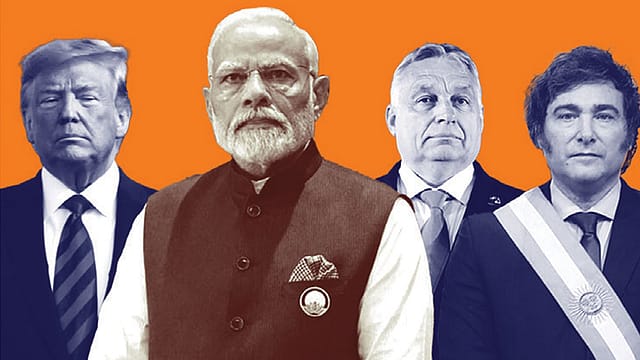In Search of A Conservative Icon

IDEOLOGY AND ICONOGRAPHY GO TOGETHER. History may tell us now that most of them were false gods, promising heaven and building prison. But history could be read as retrospection aided by archival knowledge. There is also the temptation to see the past through the moral prism of the present, as it is being practised on the left side of scholarship today. Still, the ideological epics of liberation were not complete without the motif of the liberator-turned-tyrant. It could be argued that only the dialectics of domination have changed, that the prisons have gone mostly figurative, for autocracy—and stage-managed democracy—requires a system with top-notch noise elimination technology. Power, in the end, corrodes icons.
The Right is feeling it. As its most high-profile examples, we have the Orbáns and the Mileis struggling against the erosion of their aura that once evoked awe and adoration among conservatives worldwide. The cult of Viktor Orbán peaked with starstruck endorsements from Trump and Tucker Carlson, as if the liberal-turned-conservative was the last restorer of cultural nationalism, bringing to the ethos of governance the sanctity of flag, family and faith. For the NatCons in search of a Moses, there he was, rewriting the story of the nation in a post-communist world in a moral script borrowed from an abridged Burke and the playbook of the commissars he had raged against. He started the war on unchecked immigration long before the right made it the biggest threat to the idea of the nation. In his pursuit of a new nationalist ideal, Hungary’s prime minister needed to control the story, and he did it through glib propaganda. The question is whether he would be able to control the upcoming election. That the electoral threat to him is serious enough is itself a crack in the icon.
Openomics 2026: Continuity and Conviction
06 Feb 2026 - Vol 04 | Issue 57
The performance state at its peak
It was Thatcherism on steroids that set apart Javier Milei, the Argentinean president, as a necessary subversive when he came to power. Today, what we read mostly about him is how fast he is becoming an ordinary politician fighting for the benefit of a legacy. Which brings us back to the one towering over them all: Donald Trump. He is still trapped in a paradox: the man is less than the ideas he has tapped into. The more he tries to make America great again, the more his style diminishes him. The most definitive conservative disruptor in America after Reagan is certainly not apologetic about Nation First, but the reign of kitsch has made the First Nationalist an emblem of vainglory. No room for iconography here as Trump is his own hagiographer.
This banalisation of the pioneers is happening at a time when the right, radical or not, is on the rise across Europe and elsewhere. Look for a perfect hero, even if it is a paperback edition of a Disraeli or a de Gaulle, to take the conservative chatter to a higher pitch and you cannot go beyond a Trump or a Nigel Farage, the street-smart leader of Reform UK. If the politics of national renewal is a permanent provocation, their politics will own the future. Farage, increasingly seen as the next prime minister, is more a reflection of conservative crack-up than conservatism reimagined. He is the story of the times: the usurper is made possible by the repudiation of tradition. In America, the conservative establishment could not preserve the best of Reaganism or the idealism of Bush-era neocons. It took an ‘outsider’ like Trump, no matter he descended from the golden tower, to reclaim the base. In Britain, as Conservatives began to disown Thatcherism and courted the sociology of a broken Britain, at play was ‘compassionism’, not conservatism, making a Farage inevitable. And the common theme that alienated the traditional right everywhere was immigration. They pretended it didn’t exist, till the radicals turned it into the pivot of power.
Power is a merciless normaliser. It abhors iconography. The right wins power and loses the heroes. It all boils down to choosing between the decencies of democracy and the rewards of autocracy. It is here that the Indian story, dominated for more than a decade by Narendra Modi, stands out, as a moral reminder to the global right. If Modi is the most popular nationalist in power today, it is a testament to his creative use of democracy rather than a manipulation of it. Power is a permanent argument for him, and to win it is to win the trust of a people who have a history of blasting icons at the right moment. If conservatives need an icon that still sells, they have to look east.
